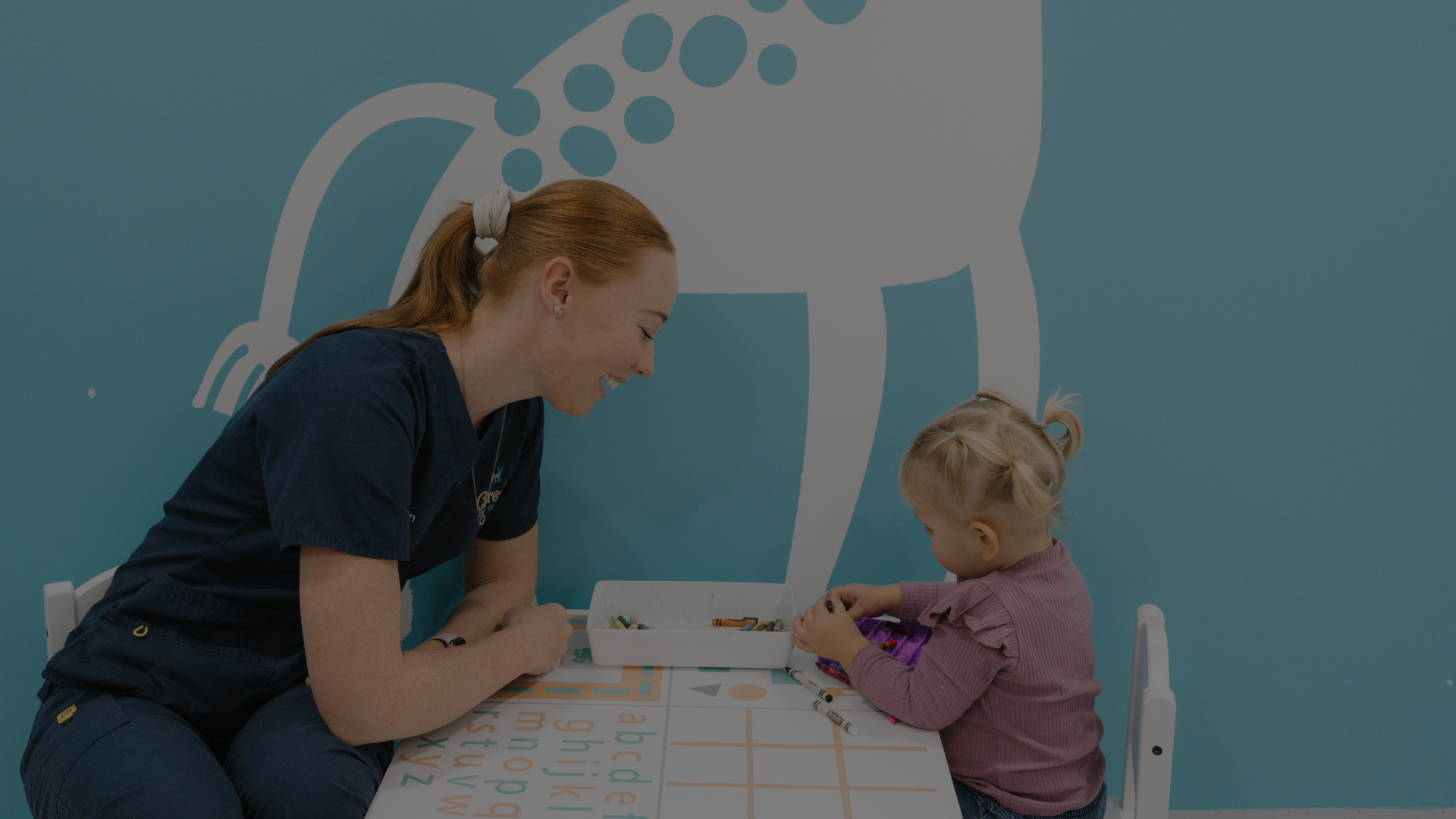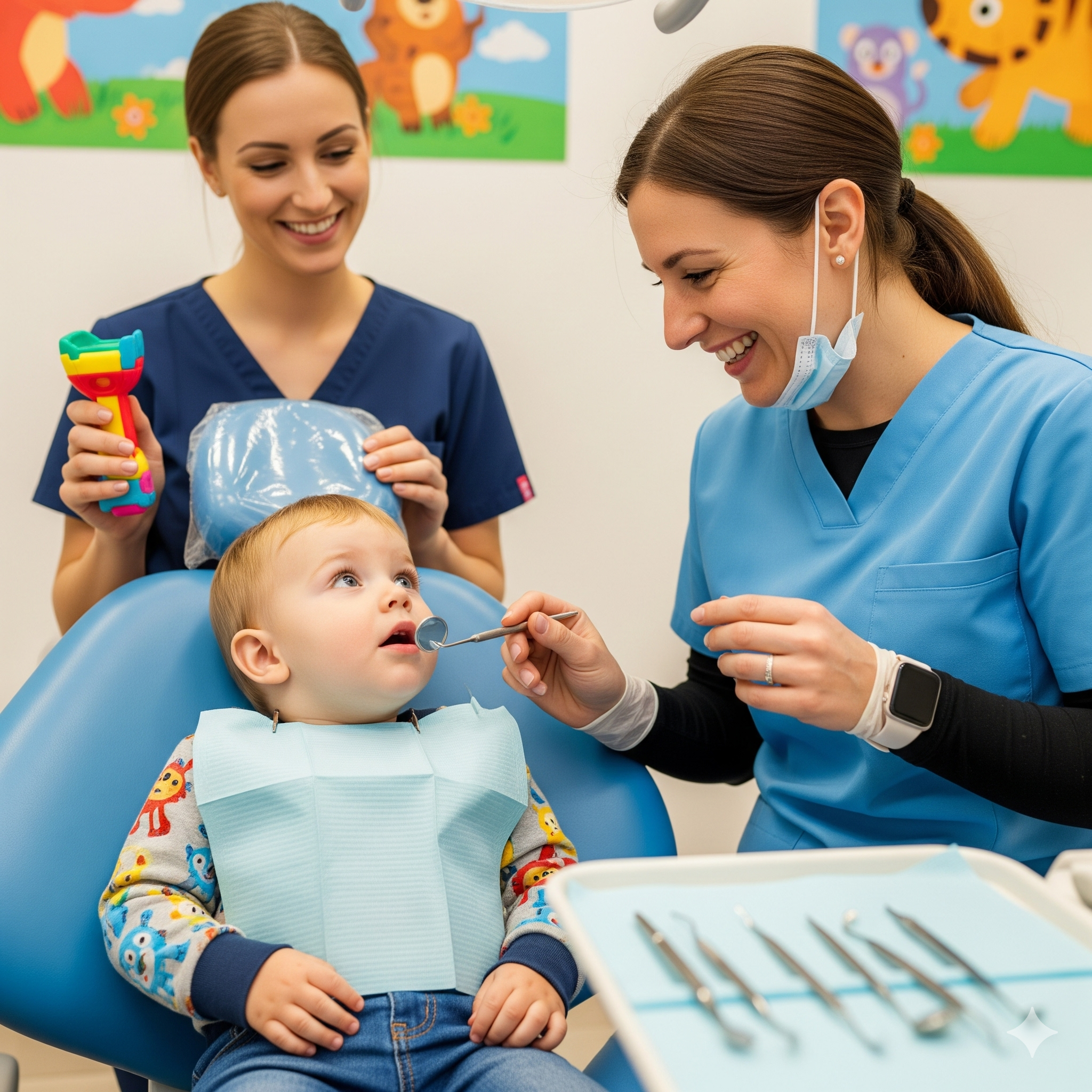Your child’s first tooth should bring smiles, not stress—yet nearly 1 in 4 kids fear the dentist. The good news? Child friendly dentists use science-backed techniques to minimize dental anxiety in kids. From playful décor and tell-show-do chats to “happy gas” and sensory-smart rooms, these specialists turn check-ups into adventures.
If you’re wondering how to choose the right paediatric partner—or why Children’s Dental Clinic in North Brisbane draws families with its impeccable facilities that help beat anxiety of dental checkups in kids – then read on. Discover seven proven anxiety-busters, insider tips for a hassle-free first visit, and answers to every parent question about nitrous oxide, baby teeth, and more!
Quick Summary – The blog explores how child friendly dentists can help reduce the dental anxiety in kids using science-backed techniques such as the tell-show-do, creating the sensory-smart environments and using advanced and safe treatment procedures like happy gas dental treatment. It highlights Children’s Dental Centre in North Brisbane as a safe space for kids to undergo dental treatments.

Why are the Major Reasons for Dental Anxiety in Kids?
The common triggers for dental anxiety in children are as follows:
- Previous pain or trauma: A past filling, extraction, or even a “pinch” from an injection can imprint a strong fear memory in the children.
- Sensory overload: High-pitched drills, the bright operatory lights, any unfamiliar smells, and the feeling of the instruments in the mouth overwhelm some children’s auditory and “sense of touch”.
- Parental modeling: When a parent voices their own dental worries or recalls one of the bad experiences that they had, children often absorb that anxiety. How? By simply observing the gestures and the conversation between parents and doctors.
- Fear of the unknown: Kids will usually have a limited understanding of what will happen. This often leaves the kids imagining the worst-case scenarios, especially at the first dental visit for baby in North Brisbane.
- Loss of control: Reclining in a chair while the strangers (even family friendly dentist) work in their mouth can make the child feel helpless. This often results in the amplification of the stress responses leading to anxiety.
How Widespread Is the Dental Anxiety Problem in Children?
A 2021 global analysis of 50 studies found that 23.9% of 3- to 18-year-olds experience clinically significant dental anxiety. These anxiety rates were highest in preschoolers at 36.5% and tapering to 13.3% in adolescents.
Who Is a Child Friendly Dentist?
A child-friendly dentist is a paediatric dentist who focuses exclusively on infants, children, and teens, combining advanced clinical skills with kid-centric communication to deliver stress-free and preventive dental care for your child!
Child-Friendly Dentists Undergo Specialist training
- After dental school, paediatric dentists complete 24–36 months of accredited postgraduate residency covering child psychology, behaviour guidance, sedation, trauma management, and treatment of special-needs patients.
- This extra training equips them to use smaller instruments, age-appropriate language, and sensory-smart techniques that general dentists typically do not study in depth.

How are Child Friendly Dentists Different from General Dentists?
Aspect | General Dentist | Paediatric (Child-Friendly) Dentist |
|---|
Patient age range | All ages | Birth – adolescence, including special-needs children |
Post-doctoral training | None required beyond DDS/DMD | Additional 2–3 years paediatric residency |
Clinic environment | Standard adult-oriented | Playful décor, smaller chairs and customized sensory adaptations |
Behaviour management | Limited exposure | Take the kids through a series of comfort-generating experiences like tell-show-do, positive reinforcement and also offer sedation options (for adverse cases) |
Just because of this specialized preparation, child-friendly dentists can transform potentially frightening dental visits into positive memories. This also helps lay the groundwork for lifelong oral-health confidence.
7 Proven Ways Child Friendly Dentists Reduce Anxiety in Kids
- Tell-Show-Do Communication
Dentists first tell the child what will happen in simple words, show the instrument or action, and only then do the procedure. This often turns the “unknown” into the familiar and minimizes fear levels in the child dramatically. Also, regular use of this three-step routine is linked to measurably lower anxiety scores in paediatric dental patients!
- Playful, Sensory-Smart Clinic Design
Using the bright colours, toys, cartoons, and child-sized chairs transform the waiting area into a play zone that distracts the kids before the treatment begins. During the dental procedure, dentists may dim the lights or add the soft music to soften the sensory bombardment and keep children calm.
- Parental Involvement & Education
Allowing a parent or a caregiver to remain chair-side supplies an instant comfort buffer and builds trust between child and clinician. Dentists also provide coaching to the parents to use positive language and role-play at the home. This way, each subsequent visit feels routine, not risky!

- Behaviour-Guidance Techniques
- Positive reinforcement: praise, stickers, or small rewards for cooperative behaviour create happy associations with dental care.
- Gradual desensitisation: Simple relaxation drills such as “balloon breathing” teach children to manage stress during longer procedures that result in eliminating dental pain in children.
- Pain-Free Technology
Air-abrasion and laser tools help to quietly remove the decay from the teeth of the children, eliminating the sound, vibration, and the heat of traditional drills that often trigger panic in children. For very early cavities requiring visit to emergency pediatric dentist in North Brisbane, you can expect advance dental procedures that arrests decay pain-lessly—no needles, no drilling—further reducing fear.
- Sedation Options (Happy Gas Dental Treatment)
Undergoing the nitrous oxide dental treatment usually involves inhaling safe nitrous oxide-oxygen that offers fast-acting, reversible relaxation that keeps kids awake yet worry-free. This helps make longer or more complex treatments like treating Tooth abscess in child feasible without the trauma!
- Special-Needs Adaptations
Child-friendly clinics like CDC schedule appointments with special needs children dentist at quieter times, use the visual queues, and provide a low-stimulus rooms so children with autism, ADHD, or sensory processing disorders can receive care comfortably.
How CDC Helps Beat Dental Anxiety in Your Kids at North Brisbane?
Founded by Dr. Tim and Dr. Sarah, Children’s Dental Centre (CDC) operates purpose-built paediatric clinics with a new branch opened in North Brisbane, Australia. Our mission is to deliver “the highest-quality dental care from infancy to adolescence” while ensuring children in regional Queensland need not travel to capital-city hospitals for specialist treatment!
What sets CDC apart?
- Special-needs expertise: CDC dentists hold advanced training in managing autism, ADHD, and the complex medical conditions, offering child dentist anxiety management Brisbane families rely on by tailoring lighting, noise, and scheduling to each child’s sensory profile.
- Infant oral exams: Emphasizing preventive dental care that helps avoid tooth ache in children, our dentists encourage first visits before age one so early issues can be caught long before they become painful memories or anxiety triggers.
- Hospital-grade safety in-clinic - Each surgery room is fitted with the same infection-control and anaesthesia monitoring equipment you’d find in a tertiary children’s hospital. This way, complex treatments can be completed chair-side ensuring zero dental trauma for kids.
- On-site general anaesthetic sessions - For toddlers or children with severe anxiety or medical issues, CDC can also arrange specialist anaesthetists who will undertake simple dental treatment under general anaesthesia. We also allow you to use the Child Dental Benefit scheme in Australia for many dental procedures offered by us. This lets parents easily access comprehensive dental care for their children!
What to Expect at First Dental Visit of your Baby in North Brisbane?
- Warm welcome: Staff greet your child in a colourful waiting area filled with toys to melt first-visit nerves.
- Meet the dentist: A quick hello lets kids explore the chair and mirror before any exam begins.
- Tell-show-do exam: The child friendly dentist explains, shows each of the tools that will be used and then, may gently count teeth and check the gums.
- Parent consult: Dentist invites you to sit with the child and together you review the brushing timings, diet, fluoride use, and the timing of the next check-up.
- Reward time: A sticker or a small toy enables the child to celebrate their bravery during the pain free dental treatment and cements a positive memory for future visits!

Conclusion
Choosing a child friendly dentist does far more than simply calm the nerves of the child on the appointment day. Early, positive dental experiences help create a “safe dental home” where preventive dental treatment feels routine, not threatening. Also, regular visits which begin during the infancy help the dentists catch the tiny problems before they hurt the kid, sparing children the painful memories that seed future anxiety. When kids feel safe enough to ask questions and smile freely, their self-esteem grows alongside their healthy teeth. Parents also learn age-specific brushing, diet and trauma tips they can reinforce at home. This partnership plants lifelong habits and confidence, setting children on a path toward strong, cavity-free smiles well into adulthood.
Key Takeaways:
- Dental anxiety in kids is common and can arise from the pain, sensory triggers or even parental influence.
- Paediatric dentists are specially trained to manage the behavior of the children and their anxiety with the help of kid-centric methods during the dental treatment procedures.
- Starting the dental visits of your child early can help prevent the future dental hassles while also building the trust between the child, parent and the dentist!
FAQs
1). When should my child first see a dentist?
Most professional bodies advise booking the first visit within six months of the first tooth erupting and no later than the first birthday so problems like early-childhood caries can be prevented, not just repaired. This early “dental home” also lowers the risk of lifelong dental anxiety by normalising check-ups.
2). How do paediatric dentists handle children with autism?
Clinics schedule appointments at quiet times, dim lights, use weighted blankets or noise-cancelling headphones, and break treatment into short, predictable steps with visual schedules. Tailored sensory adaptations paired with the tell-show-do techniques help the children with the autism to undergo the dental care comfortably while keeping stress levels low.
3). What if my child won’t sit still in the chair?
Paediatric dentists employ behaviour-guidance tools such as positive reinforcement, short “practice rides” in the chair, and parental lap exams for toddlers. If you find that the child is still unable to cooperate, you can go for the additional options which range from the nitrous oxide treatment to a single-visit treatment under general anaesthesia, ensuring safety without the emotional trauma.
4). Are baby teeth really that important?
Primary teeth guide speech, chew food, and hold space for adult teeth. Early loss of teeth due to the decay-related issues can lead to the painful infections, nutrition issues, and even the costly orthodontic procedures later. Treating and restoring baby teeth safeguards both present comfort and future alignment of the permanent dentition.
5). How often should kids have dental check-ups?
Most children benefit from a six-month recall schedule, mirroring adult guidelines. However, high-risk groups—such as those with special needs, braces, or a history of cavities—may be reviewed every three to four months so emerging problems can be stopped early.
6). How can I prepare my child for the visit?
Read positive storybooks, role-play “open wide” at home, avoid saying “it won’t hurt,” and book morning appointments when kids are fresh. Bringing a favourite toy and keeping your own demeanour upbeat trains your child to view dental trips as routine adventures rather than dreaded events.